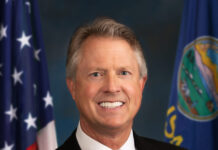Despite the political landscape, Christians and conservatives can still win when they stick up for their constitutional rights.
That’s one of the messages delivered by Liberty Counsel founder and chairman Mat Staver after his organization helped encourage a Wisconsin city to reverse an administrator’s ban on Christmas decorations.
Jim Archambo, city administrator, and Melissa Cantarero Weiss, deputy city administrator, sent an email to employees of the City of Wauwatosa signed an email that instructed employees to refrain “from using religious decorations” that are “solely associated with Christmas” in an effort to create an “inclusive” environment.
Ironically, Archambo and Weiss emphasized the need to be “inclusive” and “equitable” nine times in the letter, which cautioned about decorating public spaces in city buildings using red and green colors.
The letter added that acceptable decorations are:
- Winter wonderland — snowflakes, snow people (sic) and other non-religious symbols associated with winter.
- Lights and greenery — festive lighting and greenery can create a warm and welcoming atmosphere without specific religious connotations.
- Northern lights — draw inspiration from the aurora borealis and incorporate colors like blue, green and purple.
Going to bat for constitutional rights during the Christmas season isn’t new for Liberty Counsel, but Staver said it has been a while since “red and green” were singled out.
Years ago, Staver said, a school in Massachusetts banned parents from making red and green felt hats for kids for a Christmas event, but it’s “been a long time” since red and green has been an issue.
Liberty Counsel quickly contacted the city with a demand letter, noting the Christmas ban “violates the U.S. Constitution by showing hostility toward Christianity.”
“The First Amendment does not permit the city to eliminate Christmas holiday symbols or expression in a misguided attempt to be ‘inclusive’ by eliminating all traditional elements of expression regarding a federally and state recognized holiday,” the letter said.
The group cited three recent Supreme Court decisions — Shurtleff v. City of Boston, Kennedy v. Bremerton School District and Groff v. DeJoy. In all three cases, the ruling issued deemed it unlawful to censor religious expression. Buried the “Lemon Test” previously used to remove religious symbols and displays from the public square and reinforced Title VII protections for employees regarding religious discrimination.
Staver said there’s been a decline in issues over the years regarding Christmas controversies because people are realizing what Wauwatosa did is “just absurd and not permitted by the Constitution.”
This incident is “more of a headscratcher” Staver said because it mentioned red and green but recommended people get inspiration from aurora borealis for purple and green, but it failed to mention red. Staver said he is glad the city is backtracking.
Archambo issued a new memo, noting the original message was not a policy directive or requirement, it was just asking employees to consider “all members” of the community before deciding how to decorate public spaces in city-owned government buildings.
Liberty Counsel argued the Shurtleff case, which resulted in a 9-0 decision. The court in that case ruled a city cannot encourage employees to decorate spaces for holidays at employee discretion and then censor religious viewpoints.
Staver added that the city is supposed to respond officially by the end of the day Friday, but city officials are stating on social media feeds they’ve revised the guidance.
So, how did this happen to begin with?
“I think that there were some Wauwatosa administrators that frankly took political correctness to one extreme and maybe they have a very strong opposition, some of them, of Christians or Christian viewpoints or Judeo-Christian history,” Staver said. “We weren’t informed as to why they did what they did other than they used the excuse some people have come in and expressed comments about some of the decorations. Well, that’s fine, but that doesn’t give them the right to create this directive that literally censored Christmas.”
Despite using the terms inclusive and equity nine times in the memo, Staver said the memo was anything but inclusive regarding Christmas-related viewpoints.
“Their motive or objective was pretty clear,” he said. “I don’t know how you could be so ignorant to suggest that that’s normal or constitutional other than you’re somebody who has some other motive and that motive clouds their objectivity.”
So despite the direction it seems the political winds in the country are blowing, Christians can win when they stand up for their rights.
“This case really illustrates that,” Staver said. “If the people had just been silent, this absurd and unconstitutional directive would become the policy and the law in Wauwatosa within the government buildings. But because there was resistance and accountability required by these government officials within a very short period of time, they backed away. I think it really should encourage people to stand up for their rights and not allow their rights to be trampled. If you do and you walk away from it, that unconstitutional act becomes a policy and it impacts somebody else.”
Liberty Counsel has defended Christmas for decades. It is entering its 21st year of the Friend or Foe Christmas campaign to educate and, if necessary, litigate to make sure Christians and Christmas are not censored.
Years ago retailers began to censor Christmas and it became common for Christmas trees to instead be called holiday trees. Walmart, for example, instructed employees that if someone greeted them with Merry Christmas, the employee wasn’t supposed to respond in kind but instead expected to say Happy Holidays. If someone said Happy Hanukah, they could respond in kind.
Walmart pivoted after Liberty Counsel educated people on the policy. The next year, Walmart vowed to celebrate Christmas earlier and return to using the Christmas terminology.
“Had we remained silent, it would’ve become commonplace,” Staver said. “You would never see ‘Christmas’ in the retail market. It became pretty widespread. It was a trend and it spread across the country.”
A tradition between a community in southern Canada and Boston turned controversial as well. There was a fire years ago in the Canadian community and Boston firefighters assisted in putting it out. Every year the city chops down a 40-foot spruce tree and puts it on the back of a tractor trailer and hauls it to Boston. That tree serves as the city’s Christmas tree.
But when it arrived in Boston one year, the mayor said it wouldn’t be called a Christmas tree but instead a Holiday tree.
“There was a big uproar,” Staver said.
Christmas is back in style, but only because people were willing to fight and defend it.
“A Christmas tree is a Christmas tree — it is only used to celebrate one holiday,” Staver said. “It isn’t Thanksgiving. It isn’t Kwanza. It isn’t Hanukah. It isn’t New Year’s. It isn’t the Fourth of July. It’s a Christmas tree, so call it a Christmas tree.”

















[…] VICTORY! Wisconsin city officials retract ‘absurd, unconstitutional’ Christmas ban …the mayor said it wouldn’t be called a Christmas tree but instead a Holiday tree. “There was a big uproar,” Staver said. Christmas is back in style, but only because people were willing to fight and defend it. “A Christmas tree is a Christmas tree — it is only used to celebrate one holiday,” Staver said. “It isn’t Thanksgiving. It isn’t Kwanza. It isn’t Hanukah. It isn’t New Year’s. It isn’t the Fourth of July. It’s a Christmas tree, so call it a Christmas tree.” […]